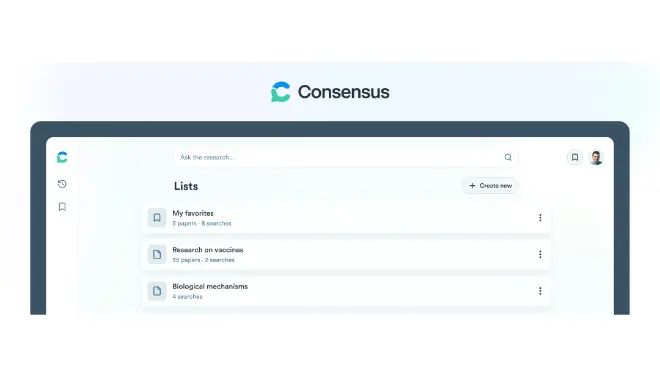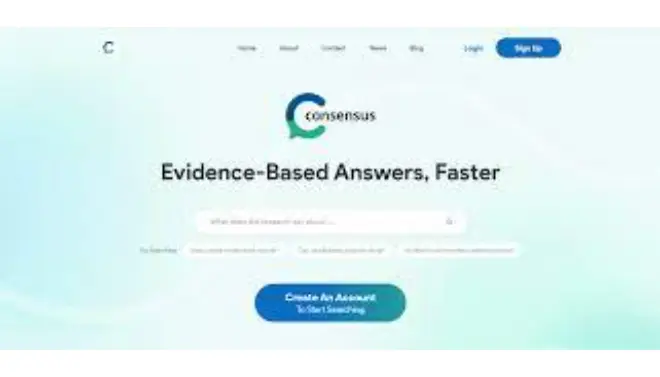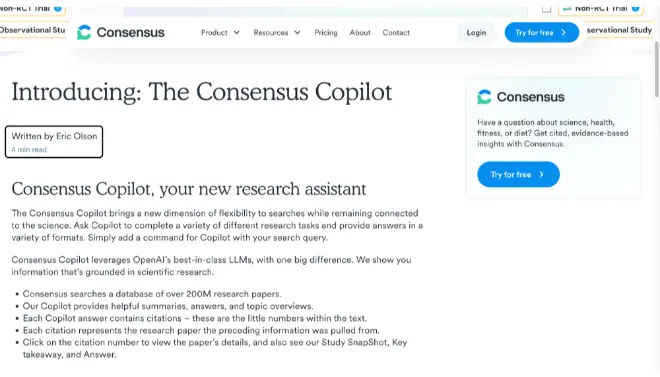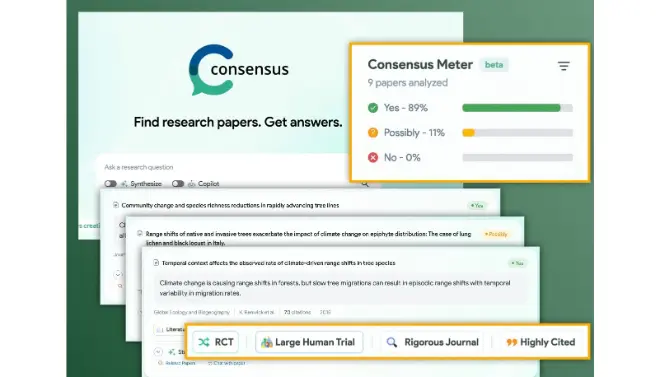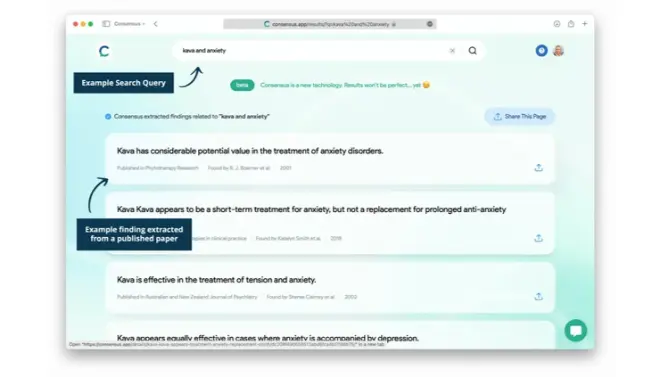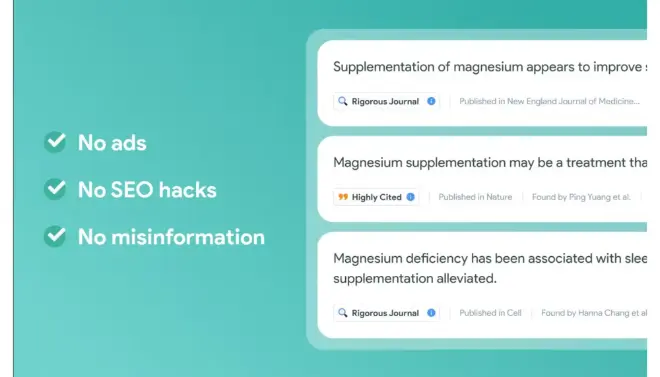Consensus is a specialized AI search engine that has successfully bridged the gap between traditional academic databases and modern generative AI.
Introduction
In the era of information overload, finding the definitive, evidence-based answer to a scientific question can feel like searching for a needle in a haystack. Consensus was developed in 2020 to solve this by creating an AI-powered search engine dedicated solely to validated, peer-reviewed science.
Consensus functions as an intelligent layer on top of academic literature. Users can ask questions in plain language (e.g., “Does intermittent fasting improve cognitive function?”) and receive an immediate, synthesized summary that draws from multiple relevant studies, complete with in-line citations. This approach dramatically accelerates the early phases of research, helping users quickly validate a hypothesis, understand the general academic sentiment on a topic, and identify key papers and research gaps—all while ensuring the integrity of the source material.
Peer-Reviewed Only
Evidence Synthesis
Consensus Meter
Review
Consensus is a specialized AI search engine that has successfully bridged the gap between traditional academic databases and modern generative AI. Co-founded by Christian Salem and Eric Olson, its mission is to deliver evidence-based, reliable answers instantly, cutting through the noise of the general web. By exclusively indexing a massive database of over $200$ million peer-reviewed scientific papers, Consensus avoids the hallucination and low-quality sourcing issues common with other large language models.
The platform excels at distilling complex scientific literature into synthesized summaries, each backed by direct quotes and citations. Its signature “Consensus Meter” feature—which visually quantifies the level of agreement or disagreement among studies on a specific question—is invaluable for researchers, clinicians, and students. While it’s not an end-to-end systematic review tool like Elicit, its ability to quickly provide a high-level, credible answer, and a foundational set of papers makes it the fastest way to achieve “evidence-based fluency” on a topic.
Features
Peer-Reviewed Search Only
Strictly searches a corpus of over 200 million scientific papers, eliminating non-academic, SEO-optimized, or unreliable web content.
AI-Generated Synthesis
Instantly generates a synthesized summary answer to a user's question, drawing on findings from multiple relevant research abstracts.
Consensus Meter
A unique visual tool that analyzes the sentiment of the search results to show the percentage of studies that support, contradict, or mention a finding.
Deep Search (Pro Feature)
A structured workflow that breaks down complex research questions into sub-topics and provides a literature review of up to 50 papers.
Study Snapshots & Filters
Provides instant analysis of study design, population details, and sample size for quick quality appraisal.
Ask Paper/Copilot
Allows users to interactively chat with a specific PDF or the collective body of search results to ask follow-up questions for deeper context.
Best Suited for
University Students
Ideal for quickly finding credible sources for essays, reports, and literature review sections of dissertations.
Clinicians & Medical Professionals
To rapidly check the evidence and consensus behind a diagnosis, treatment, or clinical practice question.
Business Intelligence & Consultants
For high-speed gathering of market or science-based evidence to support strategic reports and recommendations.
Early-Stage Researchers
To perform initial scoping searches, identify research gaps, and establish a foundational understanding of a new domain.
Evidence-Based Content Writers
Enables journalists and writers to quickly verify facts and integrate peer-reviewed evidence into their non-academic content.
Librarians & Academic Staff
To guide patrons toward high-quality, synthesized evidence from verified sources.
Strengths
Source Reliability
Speed of Insight
Ease of Use
Research Quality Indicators
Weakness
“Black Box” Algorithm
Limited for Humanities
Getting Started with Consensus: Step by Step Guide
Getting started with Consensus is as simple as asking a question to a research assistant.
Step 1: Navigate to the Search Bar
Go to the Consensus website and utilize the free search bar available on the homepage.
Step 2: Ask a Clear Research Question
Enter a specific, closed-ended question (e.g., “Is aerobic exercise beneficial for memory in older adults?”) rather than broad keywords.
Step 3: Analyze the AI Synthesis and Meter
Review the instant, synthesized answer generated by the AI. Look at the Consensus Meter to see the general level of support for a finding.
Step 4: Explore Supporting Evidence
Scroll down to view the snippet results and study snapshots. Filter the results by criteria like Study Type, Date, or Quality Indicators to refine the evidence.
Step 5: Save and Cite
Save relevant papers to a custom list, and use the built-in citation tool to instantly generate a reference in your preferred format (e.g., APA, MLA) for direct use in your writing.
Frequently Asked Questions
Q: Where does Consensus get its data from?
A: Consensus exclusively searches and analyzes a corpus of over 200 million peer-reviewed scientific papers from reputable academic databases like Semantic Scholar, CORE, and SciScore.
Q: Can I use Consensus for a Systematic Review?
A: Consensus is an excellent tool for the discovery and evidence-gathering phase of a Systematic Review, but dedicated tools like Elicit or traditional database searches are still needed for the full, auditable screening and protocol-driven process.
Q: What is the Consensus Meter?
A: The Consensus Meter is an AI feature that analyzes the findings of relevant studies to provide a visual, quantifiable score representing the level of agreement among the scientific literature on the question you asked.
Pricing
Consensus offers a popular freemium model that is accessible to all students and researchers.
Free Plan
$0/month
Unlimited searches; Limited access to Pro Analyses, Deep Searches, and Study Snapshots.
Pro Plan
$10/month (Total: $120/year)
Unlimited Pro Analyses & Study Snapshots; 15 Deep Searches/month; Unlimited Ask Paper messages.
Deep
$45/month (Total: $540/year)
Everything in Pro; 200 Deep Searches/month; Ideal for power users and systematic reviewers.
Alternatives
Elicit
A strong alternative that is better suited for systematic reviews, providing structured, customizable evidence tables from a large corpus of academic literature.
Perplexity Pro
A general-purpose AI answer engine with excellent source-citing capabilities, offering a broader search that includes academic papers alongside non-academic web content.
ResearchGate/Academia
Social networking platforms for researchers, focused on sharing papers, getting feedback, and accessing pre-prints, rather than AI-driven synthesis.
Share it on social media:
Questions and answers of the customers
There are no questions yet. Be the first to ask a question about this product.


